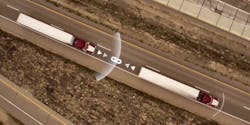Truck platooning should boost fuel economy, project finds
A cooperative research project led by Auburn University and the American Transportation Research Institute (ATRI) finds tractor-trailers could experience fuel savings of 5% to 10% if they were controlled by platooning technology.
Officially dubbed the Driver-Assistive Truck Platooning or “DATP” initiative and funded by a grant from the U.S. Department of Transportation's exploratory advanced research program, phase one of the project focused on developing a detailed “business case analysis” regarding this technology and determined that platooning could boost fuel economy for the “trailing truck” by up to 10% and up to 5% for the leading truck.
Yet Dan Murray, ATRI’s VP of research, told Fleet Owner those fuel economy numbers are “relatively optimistic” and that real-world data will be gathered during phase two research, which will be conducted on Auburn’s 1.7-mile track at its National Center for Asphalt Technology center and in limited on-road “pilot testing.”
“Phase two is where we’ll roll up our sleeves and conduct the real work,” he said, noting that DATP project is using Peterbilt tractors equipped with radar, vehicle-to-vehicle communication systems, and video technologies supplied by Peloton Technology and Meritor Wabco.
Other findings Auburn’s researchers disseminated from this “phase one” analysis include tests include:
- TL and line-haul LTL operations would likely be the greatest beneficiaries of a platooning system, particularly among larger fleets;
- Fleets and drivers who operate average truck trips of more than 500 miles would experience the highest returns on investment from platooning. By contrast, ATRI’s Murray said straight trucks in urban areas are not a good fit for this technology.
- Small fleets and owner-operators will require an investment payback period of 10 months to make platooning viable, while the mean payback expectation for larger fleets is 18 months.
Murray noted that one of the biggest challenges facing the use of platooning technology in trucking is who gets the lion’s share of the fuel savings.
“Using this technology within a fleet isn’t the issue,” he explained. “It’s when different fleets use this technology on the road, because the second truck in the ‘platoon’ gets substantially higher fuel savings than the lead truck. The million-dollar question is how to make sure everyone benefits equally from platooning in such situations.”
Murray noted that one option being looked at is the use of “subsidy payments” from the second truck to the first truck as one way to compensate for that fuel saving disparity.
He pointed out that phase two of the DATP project will also monitor and assess a variety of “human factor” issues as well, including driver satisfaction, driver training requirements and driver operational experiences.
“We’ve found that a relatively large percentage of drivers are nervous about this technology, especially in terms of safety,” Murray added. “Anecdotally, however, we’ve found younger, rookie drivers are more amenable to this technology than older, experienced driver used to being in control of the truck all of the time.”
About the Author
Sean Kilcarr
Editor in Chief
Sean Kilcarr is a former longtime FleetOwner senior editor who wrote for the publication from 2000 to 2018. He served as editor-in-chief from 2017 to 2018.
